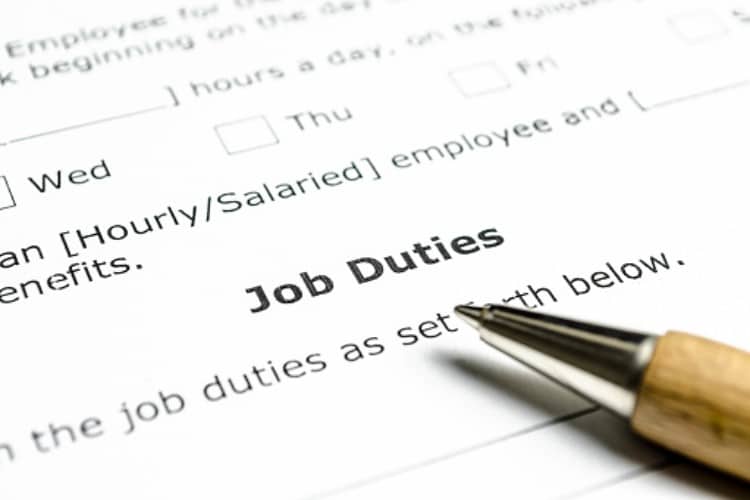Sometimes, interviewers reject nervous candidates and frequently they don’t obtain the job. Organizations and businesses may frequently reject qualified applicants who exhibit interview anxiety even though they are otherwise fully competent in performing the job.
The modern workforce suffers from anxiety. In reality, anxiety problems afflict 40 million persons in the US. Many people’s anxieties at work can act as significant triggers, therefore it makes sense that 73% of individuals think changing careers is one of the most stressful life events.
The pressure to do well in an interview increases while seeking a new job or changing careers. Your performance in interviews, and ultimately, your mental health, can be negatively impacted by the stress and worry you experience during job searching.
Are tense candidates rejected during interviews?
You are aware that there are other candidates being interviewed; it is a competition. And a great deal depends on it. Therefore, it is normal to feel anxious when meeting with someone who is evaluating you, comparing you to others, and who has the authority to make a choice that could have a significant impact on your life. Employers will be monitoring to observe how you behave and behave under pressure.
If it was just the interview, they probably wouldn’t be concerned about your anxiety. You were only put in a high-pressure situation during the interview. These will arise in the majority of employment. Presenting during a significant client meeting? At the checkout counter, are you dealing with a displeased customer? Is a delivery person yelling because the pick-up isn’t ready and he’s on a schedule?

Can you maintain composure? You have the ability to think quickly under pressure and defuse potentially volatile situations. When you’re anxious, are you able to make decisions and act professionally? Employers care about this since they can tell by your degree of calmness throughout the job interview.
How would you show this? Dry hands shaken firmly. correct eye contact Positivity and assurance in the body language. These have a big impact.
What causes nervousness?
Since humans formerly lived in caves, the human brain is hard-wired to assess danger and react. This habit really causes more harm than good in the modern environment since it is difficult for our brains to discriminate between contemporary uncomfortable ideas and actual physical dangers.
When anxiety strikes, the limbic system and the amygdala, a group of neurons in the brain that process emotions, are instructing the body to respond to the notion, such as “I’m going to flunk this interview,” in a manner similar to how it would if a predator were pursuing the individual. The main cause of interview anxiety is the perception that one’s quality of life depends on how well they perform in the interview.
Read this article for more useful insights: 9 reasons why interviews make you nervous
How to manage anxiety or nervousness?
Understanding the root reasons of anxiety is essential for managing the symptoms that emerge prior to, during, and even after the job interview.
Before an interview
Arousal and anxiety are same from a physiological standpoint. Too much arousal will make you more anxious, which will probably affect how well you perform in the job interview. In a same vein, if there is insufficient stimulation, you could come across as uninterested or worn out.
You need to examine your thoughts, ascertain how you’re feeling, and decide what you need to do to get a balanced arousal in order to enter the ideal mental state for peak performance.
In essence, do you need to relax or do you need to energise yourself?
Reconsider the anxious thoughts in your head and alter them to reduce arousal levels and relax down. Even though it may seem unproductive, there are instances when you have to debate with yourself about whether ideas are valid. Positive affirmations that reduce anxiety and arousal levels include “This interview is not a life or death situation” and “My family and friends will still love me if I do not obtain the job.” Focus on ideas like “I’m a perfect fit for this role” or “I’m prepared for this task” to arouse yourself and get you going.
Preparation is a crucial step if you believe that your anxiety is still at a level where it will affect how well you perform. Do some preliminary research on the business and try to learn as much as you can about it. Then, spend some time considering the challenging questions you might be asked and working on developing responses. You prepare your mind for anticipated situations by practising potential queries.

During an interview
An elevated heart rate is one of the first physical signs of stress. Breathing exercises are a simple approach to lower your heart rate to a normal range. Your heart rate will really slow down when you take calm, deep breaths, which will also reduce your stress and help you feel more at ease.
If you need to take a discrete deep breath during an interview, no one will notice, and it will make you seem more at ease and assured when it’s time to respond to the following question.
When an interviewer asks a question, many people make the anxiety-related mistake of starting to talk right away; they answer before they even know how they want to proceed. It’s acceptable to wait a few seconds before responding to a question if you find yourself in a predicament where you are unable to do so immediately; doing so is preferable to having your anxiety speak for you.
Cold hands are another indication of tension and worry in addition to an elevated heart rate. In addition to taking a moment to breathe, you should try to warm your hands to help you stay centred and grounded.
Again, the limbic system and amygdala react to what you tell yourself just as they do to physical events that are taking place in front of you. While you’re interviewing, be prepared to say something like, “I am exactly what this company needs,” or “My skills will help this company succeed.”
Your ability to deliberately replace negative, anxious ideas with calming, positive ones will show the interviewers that you are confident and composed by causing your negative thoughts to leave your mind. You’ll feel substantially calmer if you aggressively treat the bodily signs of stress while also thinking positively.

After an interview
After the interview, anxiety may not necessarily subside. It’s really simple to overthink the interview and develop spiralling, unfavourable thoughts. If you obtain the job, these might go away, but if not, they might get worse.
Exercises that promote mindfulness are one effective way to lower anxiety. These exercises are made to lessen the number of ideas running through your head, lower the levels of cortisol and adrenaline coursing through your veins, and trigger your body’s relaxation reaction.
It has been shown that mindfulness can help battle the harmful consequences of anxiety, especially when used in conjunction with cognitive behavioural techniques that alter thought patterns. Examples of behavioural tactics that help alter your negative thinking include things like visualisation and visualising how you would speak to a buddy if they were in your shoes.
A certain amount of uneasiness is entirely normal and healthy, and almost everyone has felt some worry before a job interview. However, if the tension and worry become incapacitating, you can control your mental health by engaging in breathing exercises, changing your way of thinking, or even using online treatment tools and in-person therapy.
Other common reasons for getting rejected after an interview
After a stellar interview, you could still be turned down for a job for the following reasons:
1. There is fierce competition for positions.
It’s vital to keep in mind that when applying for any job, there are frequently numerous individuals vying for the same post. Even if you might be highly qualified and possess all the necessary skills, there might be other applicants with a greater profile. Even after a fantastic interview, the hiring manager can still choose to move forward with another candidate under such circumstances.
If this occurs, you can focus on enhancing your credentials and obtaining a higher degree that is relevant to the position. To increase your chances of being chosen by a different organisation, keep applying to jobs that are comparable to the ones you already have and keep working to enhance how you perform in interviews. Even if they choose another applicant, recruiters may keep your profile for future use and contact you if a position becomes available.

2. Inconsistent punctuality
Being on time is among the most crucial elements that go into a successful interview. If you were late for the interview, the interviewer might think you were less serious about the job and have an unfavourable impression of you as a result. The interview may still go on since they appreciate your time, but the unfavourable impression may hurt your chances of getting the job.
It’s crucial to be ready for delays and be early at the event because circumstances could arise that are beyond your control. It’s a good idea to wait nearby if you come very early and go to the venue only 15 to 20 minutes before reporting time. Additionally, it’s crucial to apologise to the recruiter for keeping them waiting and express gratitude for continuing to review your application when you are late for an interview.
3. A lack of dialogue with coworkers
Hiring managers search for applicants during interviews who can contribute to teams and have potential for advancement within their organisation. Recruiters may observe your behaviour outside the interview session to make this determination. Even if your interview went well, you can still be dismissed. If you acted impolitely toward the receptionist or the other candidates. Such occurrences demonstrate to employers that you might struggle to operate in a team and might struggle to get along with your subordinates. For this reason, it’s crucial to be aware of how you come across and to keep a positive outlook during the interview.
4. Misalignment with corporate culture
Many hiring supervisors demand that applicants complete a questionnaire-based personality test. Sometimes, questions like “What are your strengths and weaknesses?” or “How do you settle problems within a team” may be used to gauge this during the primary interview. Employers can assess your personality, values, and teamwork skills with the help of these questions.
Despite having a wonderful interview, you could still be rejected if your values don’t align with those of the organisation. There may be a cultural mismatch if the organisation has a rigid structure and hierarchy. Yet you’re hoping for creative flexibility. By visiting their corporate website and social media sites, you can read about the company’s beliefs and aims. Also, try to grasp their work culture.

5. Failure to follow instructions
Even if you had a flawless interview, you can still be denied. If you weren’t given a case study to complete and submit within 48 hours after your interview. Writing an email to the hiring manager to explain your position and ask for more time is an excellent choice. If you were unable to submit the case study on time for a legitimate cause.
Occasionally, recruiters could give precise instructions that could evaluate your ability to follow directions on the job. If you don’t follow them, the recruiter may think you have problems following instructions, which may leave a bad impression. By setting up reminders that are activated one day before to your interview, you may prevent this and be ready.
6. Inappropriate attire
It’s crucial to dress professionally when attending a job interview. This involves having clean clothes, shiny shoes, and good grooming. When you show up for an interview wearing a jacket that isn’t ironed, it makes a bad impression on the interviewer. Particularly for jobs that require direct interaction with clients, such as front office managers, ticket agents, or sales representatives, this is crucial. Enrolling in a grooming programme that will educate you how to look professional for your interview is a wonderful idea if you need help picking what to wear.
7. Negative body language
The recruiter might infer information about your confidence and work readiness from your body language. Interviewers search for non-verbal signs even if you have exceptional communication skills and correctly answered all the technical questions. Overly animated hand motions, trembling while speaking, or fidgeting with your pen are all indications of anxiety. You can project an air of confidence, calmness, and relaxation by practising a solid handshake, maintaining eye contact, and using pleasant facial expressions.
Go through this article for more information: How to ace your interview with the right body language?
8. Inadequacy of job requirements
A recruiter may give you the chance to see if you can still do effectively at the job. Despite your professional experience if you are a hotelier applying for a marketing position. Such interviews aim to determine whether an applicant has the fundamental knowledge and disposition to pick up new skills on the job. Even if the interview went well, you can still be turned down. Because your skill set may not be compatible with the demands of the position. If such a circumstance arises, you can enrol in professional courses. You can obtain the necessary knowledge and credentials before searching for positions that are similar.

9. A lack of limits in the workplace
To see if you divulge personal information or step outside of your comfort zone, your interviewer may occasionally create a cosy situation. It aids the interviewer in determining whether you have the ability to establish limits and uphold professionalism in the workplace. Even after a strong interview, you can still be dismissed if you disclosed undesired personal information to your interviewer. One method to prevent this is to make sure that you only give information that is pertinent to your profession. And kindly decline a question if you feel it could be getting too personal.
10. Poor attitude
Your interviewer may frequently ask you why you left your previous position. Your selection may suffer if you criticise your former employer or speak poorly about the office environment, your coworkers, or your manager. It’s crucial to give a good response, even if you had a bad experience at your prior work.
11. Online visibility
After the interview, hiring supervisors could frequently look up your social media profile. Even after a strong interview, you can still be passed over if you are well-known in the public. This occurs when businesses desire to keep their internet presence hidden, and your significant online presence can highlight their brand. It is a good idea to keep your social media profile secret while looking for employment.
12. Inadequate aftercare
It’s a good idea to thank the recruiter through email after your interview. It shows your appreciation for their time and efforts. If you do not hear back from them within a few days, you can then send a follow-up message. It demonstrates both your professionalism and your sincere interest in the position. To gauge your interest in the position, interviewers may occasionally wait a while to get back to you following the interview. You can be turned down after your interview if they haven’t updated you after a week and you neglected to ask for one.

Final words
When looking for work, it’s customary to submit numerous applications at once, show up for several interviews, and select the one that offers the best working conditions. Even after a seemingly positive interview, candidates occasionally experience confusion when they are rejected, which can lower their confidence.
Employers seek candidates that are excited about their work, see the position as a wonderful career progression, are able to persevere and perform well under pressure, and who they will love working with and laughing with on a regular basis. In the job interview, that’s what they’re actually searching for.






